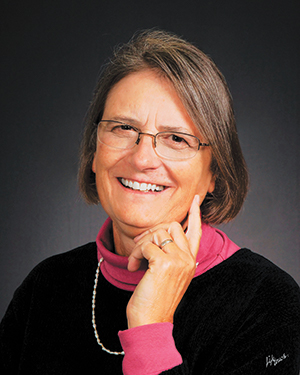Recovering a lost language or learning to speak a language doesn’t happen overnight. But a desire to learn will unbolt the door—swinging it wide open—and fill our lungs with sparkling morning air.
We can learn to talk about faith in ways that are honest. We can recover winsome beauty that was lost. We can salt our talk with tears and astonishment. We can capture the grief, joy and power of what we long for, believe in, and love—with strange and wondrous sacred words that reach out to each other and to God.
When we vulnerably speak what we know to be true in our own bodies, minds and spirits, we will be on our way toward fluency. We will provide children with anchoring language to resist manipulation by the superstitious scaremongers of the world. We will give ourselves language with the gravitas needed to repent of family-, community- and earth-destroying patterns of living. We will regain moral resolve to help save the world for our children and grandchildren.
Unfortunately, we don’t have many models for how to speak in trustworthy ways about faith that don’t sound like insider Christianese or religious code speak. Many of the voices we hear in public sound affected, pushy or offensive. Yet people of faith throughout history have demonstrated countless times how sacred language used well can bring out the best of our humanity, inspiring culture and conscience, sacred music and science—mobilizing vast movements of ordinary people to pursue a vision for God’s peaceful, just and beautiful shalom.
Rather than faith being something we go mum about, and hold in secret—or, as sociologist Peter Berger is reported to have said, something that is only “done in private between consenting adults”—we can find the resolve to name what we love and lament; to express something true from the depths of our longing; to acknowledge how hard it is to trust that all will be well, and to describe our desire to know and be known by God.
In my fumbling attempts to speak vulnerably about what I do and don’t know of who God is; how we come to know God; and what the Bible, nature and other cultures teach us about God, more often than not, I fail. I’m grateful for grace. Grace to fumble out loud. Grace to fumble forward by daring to break open fresh ways to talk about God.
I offer several principles that, I believe, can guide our shared desire to learn the art of talking about faith—giving voice to what we know and don’t know about God.
These are ground rules for learning to talk about faith with authenticity, humility, love and conviction. They will give us the best chance for flourishing in these stressful times. They will provide sturdy ground from which to speak with moral integrity to our children—and to the listening world.
First listen!
To speak about faith with authenticity, we must always first listen. A favourite Scripture that has guided my stumbling ventures to speak is from the prophet Isaiah: “The Lord God has given me the tongue of a teacher, that I may know how to sustain the weary with a word. Morning by morning he wakens—wakens my ear to listen as those who are taught” (Isaiah 50:4). Speaking with genuine understanding first and always requires listening. Many spiritual traditions name listening as indispensable to spiritual understanding, calling it by different names: contemplation, meditation, mindfulness, reflection, prayer, silence.
The question of how to become better listeners is the taproot of all that infuses the language of faith with truthfulness. Listening to each other; to our own bodies; to the trees, sky and bees; to the wisdom tradition, the daily news, the Scriptures, and the “still, small voice” that speaks despite the earthquake, wind and fire that threaten to overwhelm; listening for the Spirit.
This undertaking to listen well will involve risk. For those of us who have reasonably reliable primary relationships, security and a faith-based moral framework, the risk may not seem all that great. We’ve not lived with constant fear and so have the emotional space to wonder and be inquisitive. We can afford to risk expressing what our bodies know, respond to the presence of beauty and follow nudges of curiosity.
But not all of us. Awakening to a desire to see and hear how God is active in our world will be harder for some of us than others. Learning to listen well will require considerable time and patience—among people we learn to trust.
Submit to mystery
Leaning in to listen—whether to the pain of persons I know or to the complexity of the natural world—has deepened my love for God and also shown me how little I really know about God. The odd thing is that the less I presume to know for certain, the more a quiet assurance that I am known and loved grows within—along with a readiness to speak what I believe about God. It may seem ironic, but my experience is in keeping with what the spiritual masters say about how submission to the mystery of God will reveal God to us or open up our awareness of God “hidden in plain sight.”
Another way to describe “submission” is to reflect on humility—and what it means to be humble in the face of the mystery. A definition of humility that has served me well came from feminist theologian Rosemary Radford Ruether, who said that humility is about accurate or realistic self-knowledge. In other words, it’s not about being down on oneself, or passively acquiescing to other strong-willed persons. Being humble is about being honest with oneself—naming one’s strengths and limitations, what one is good at and may not be good at, what one knows and doesn’t know. I like this definition because it frees me to be honest about what I can say with a measure of confidence and what I don’t really know enough to speak about.
The challenge then is to find words to speak the unspeakable. Theologian Rowan Williams reminds us that language is an imperfect means of expressing what we know, which we will always struggle with until “something greater than language is here.” We each, in our own way, along with countless poets, scholars, theologians, sages, mothers and fathers, struggle to find words, metaphors, word images and stories to talk about “the simplest yet most inexhaustible of all subjects, the life upon which all life depends and the embodiment among us of that life in a human life and human words, in the person of Jesus of Nazareth.” It is a struggle—but also a marvel—to find words that begin to name the wonder of it all.
It’s all about love
Learning to talk about faith will mean figuring out how talking about God is like telling our own love story.
We can speak about faith honestly when we remember that, ultimately, faith is all about being in love—learning to trust that one is loved and to vulnerably offer love in return. As with any love story, however, honest talk will need to grapple with when love is twisted toward selfish ends. Or when love is embedded in a grand delusion about myself, my family, my church or my nation. Any talk of love will need to discern what is true and false, up-building or self-destructive, just or unjust.
A friend, Chris Rice, who is the Mennonite Central Committee United Nations liaison, posted a Facebook comment soon after the murder of George Floyd in Minneapolis: “An unarmed black man in handcuffs, pleading to breathe, killed by a white police officer as other officers remain silent and do nothing to intervene. Another terrible injustice in too long a series. Another sign of unhealed sicknesses in the soul of America [myself included]. Love is patient, yes. Yet loving those who do wrong doesn’t mean ignoring injustice. Love does not minimize sin or evil. Love is not blind to cancers, which have gone deep into the body politic. Love does not mean pretending that everything is okay. Because love without truth lies. . . .”
When talking about faith, we must tell the truth about love, our disappointment in love, failure to love, fear of love and longing for love unfulfilled—along with the joy of knowing one is beloved and expressing love even toward those it is hard to love.
Hold the world together
Faith language has sometimes been used to push people apart. Speaking about faith with integrity will require learning how to “hold the world together” amid no shortage of polarizing tensions. We can both be real with our own convictions and learn from another’s convictions. A little humility (or maybe a lot) is required to admit that one has much to learn from how others encounter God.
None of us can have meaningful conversations about faith if we’re not willing to gently hold together the tension of opposing perspectives, to ponder the truth on both sides of a divisive issue, and to let the tension of the division pull our hearts open to a larger and larger love—an image I learned from education philosopher Parker Palmer.
One of the marvels I experienced while serving as president at Anabaptist Mennonite Biblical Seminary was observing how students and faculty from across the theological spectrum related to polarizing issues. Together, as a learning community, using the best interpretive tools available, we called on the Holy Spirit to bring us from the different places we stood, closer to each other and to Jesus Christ, in whom “all things hold together,” and through whom “God was pleased to reconcile to himself all things . . . by making peace through the blood of his cross” (Colossians 1:15-20, excerpted).
Speak from storied, holy ground
Rather than assuming that faith talk is about obscure doctrines, we gain fluency step by step with stories—real stories about the messy, beautiful stuff of ordinary days. The sturdy ground needed to speak is best acquired by coming to know God in conversation with the stories of others different from us, the stories of the saints and the stories of the Scriptures.
We share stories because, while God may seem absent to many of us, some of us have God moments that remain unspoken unless we’re invited to describe what we’ve seen and heard—even if not fully formed, coherent or verifiable.
And it isn’t just our own stories that ground faith, friend and theologian Richard Kauffman said to me, but the stories of those who have gone before us—the heroes of faith often referred to as saints and the testimonies that fill the pages of the Bible.
In our desire to discover stories that shed light on what it means to have faith, we are a lot like the disciples on the road to Emmaus in Luke 24. The two disciples poured out their confusion and despair to the stranger who joined them on the road, lamenting about recent events which involved the crucifixion of the one they had hoped would “redeem Israel,” often referred to as the Messiah or the Christ. The stranger, “beginning with Moses and all the prophets,” pointed out to them all kinds of things about Christ found throughout the Scriptures.
Later, when they discovered that it was Jesus, the crucified Christ, who had been walking and talking with them, they exclaimed: “Were not our hearts burning within us while he was talking to us on the road, while he was opening the Scriptures to us?”
Listening well, leaning into mystery, talking about what we love, and holding our convictions in gentle tension with others’ convictions, while standing on storied, holy ground, will restore a greater sense of our shared humanity and desire to know and be known by God. Our children and grandchildren will be blessed—as will the watching world.
Author Sara Wenger Shenk was formerly president of Anabaptist Mennonite Biblical Seminary, Elkhart, Ind., and has also served on the faculty and administration of Eastern Mennonite Seminary, Harrisonburg, Va. This is adapted with permission from Tongue-Tied: Learning the Lost Art of Talking about Faith, © 2021 by Herald Press. All rights reserved.
Mennonite Church Canada and MC U.S.A. have designated this book as the CommonRead title for fall 2021. To learn more, visit www.commonword.ca/go/2306.
For discussion
- In what settings do you feel uneasy about expressing your faith? In what settings are you more comfortable using faith language? What kind of God language was used in your family of origin? Were written and spoken words different?
- Can you think of examples of “religious code speak”? Why do we tend to use “insider Christianese” rather than using fresh words to talk about our faith?
- Sara Wenger Shenk offers guidelines for learning to talk about what we know and don’t about God. Why is authenticity or truthfulness so important in these conversations? How do we measure authenticity?
- “Being humble is being honest with oneself,” says Wenger Shenk, who connects humility with submitting to the mystery of God. Why might it be freeing to recognize our own limitations? How can that help us talk about God in a more honest way?
- When it comes to faith talk, Wenger Shenk writes, “[W]e gain fluency step by step with stories—real stories about the messy, beautiful stuff of ordinary days.” What are some examples of stories that have touched you? Do you agree that stories are more important than doctrine? How can we encourage each other to tell more stories of faith?
—By Barb Draper










Leave a Reply
You must be logged in to post a comment.